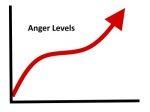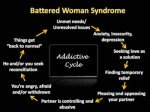Middle Child Anger
by Angie
(Washington)

I have three sons. We are a close family and spend a lot of time together. Their dad and I have been together for over a decade and have been through a lot together.
Our middle son is very sensitive, highly active (meaning he likes to go, go, go...) although not too sports oriented. He has always been passionate and as a 1-2 year old was dubbed "the screacher creature" because he would do this high pitched screech out of frustration.
I taught him sign language because I felt he was frustrated with trying to communicate but didn't have the capability yet of forming words. He would also rub his feet together HARD as a little baby out of frustration. We used to tell him, "You're going to start a fire with those feet!"
He is now 9 years old and seems to have quite a temper. He often says he "hates his life" that he "wishes he were never born" and "sometimes he wants to kill himself." He says he hates being the middle child and that his brothers gang up on him. He will kick, growl, yell, cry (not hurting others, but...).
I totally don't know what to do. We have talked and talked and talked. His brothers and he and ourselves have had meetings and come up with what we thought were solutions. He thought up being able to say "banana split" if he felt himself getting mad, to try and let his brothers know he was serious, so they could back off. My concern is that he won't grow out of this and I don't feel like I have the tools to help any more than I have.
He is a sweet, very sweet hearted boy. He loves his family, he is a kind and loyal friend ( he often gets his feelings hurt from friends) and loving towards animals. He really has a heart of gold. I think he tends to over dramatize and I am afraid he will take the victim role in life. I don't mean to undermine his true feelings by saying this, only that he has a tendency towards these things. Please help. I love that boy a ton, and want the best for him. Thank you.
Response from Dr. DeFoore
Hello Angie, and thanks for telling your story here. I can tell that you love your son very much, and have tried many things to help him. That's good, and your love for him and desire to help him are the keys to his finding his way.
I don't have "the answer" for you. I will just offer some possible approaches and tools that you might try, and you can use what works for you.
First, I want you to consider that his anger is not wrong or bad. It's there for a reason, and your job as his mother is to figure out what that reason is. Anger comes from fear and pain, and you need to find out what his fear and pain are. I don't know his exact age, but play therapy might be a possibility for him. You may want to research options for play therapy in your area.
Since his brothers are willing to help, you might try sitting around as a family and everyone talk about their fears. No pressure on him to do so, but this would possibly open a door for him to talk about his own fear. It would be great if you could include your husband in this.
Follow this with a discussion (go around the group and ask everyone) of anything that caused sorrow, frustration or anger during the day.
Then end the process with everyone telling everyone else in the room something they like about him/her.
In your own private mental process, picture your son becoming more and more calm. Do this every day, at the beginning of the day. Picture and imagine him being calm, focused and making good choices in all of his activities throughout the day. Every time you think of him, shift your focus from the problem (his troubled behavior) to the solution (him behaving in a calm, focused, positive manner). He responds to your expectations, and this is a way for you to create more positive expectations for him to respond to. Keep doing this even if it seems like it's not working. The point is to believe in him, and focus on the best of him. You might do this in a journaling process, where you write every day about his positive aspects, and set the tone for a good day with good behavior from him (that is good for him and the entire family).
See if he will draw a picture of his anger. Also ask him to draw a picture of his family, including himself. If he's willing to do this, it may give you some insight into what is going on with him.
Consider that your son's behavior is a "red flag" for something going on in your family. Ask yourself what "story" is not being told in your family. This is based on Carl Jung's theory that "children live out the untold stories of their parents." When the parents' story gets told, the child's behavior clears up. This may or not require that your family be in family therapy.
If you came to me for therapy for your son, these are the approaches I would most likely use. It would all happen in the context of family therapy.
Don't underestimate the power and the influence of your focus, Angie. How you see your son and what you anticipate of him are powerful influences on his emotions and behavior.
Believe in your son and believe in yourself.
My very best to you,
Dr. DeFoore
P.S. If you found this to be helpful, please consider making a donation to this site to support our mission to help you become your own best anger management resource.
P.P.S. If you got something of value here, we would also greatly appreciate it if you would click the "Like" button at the top left corner of this page.
We receive commissions on Amazon sales on this website.




